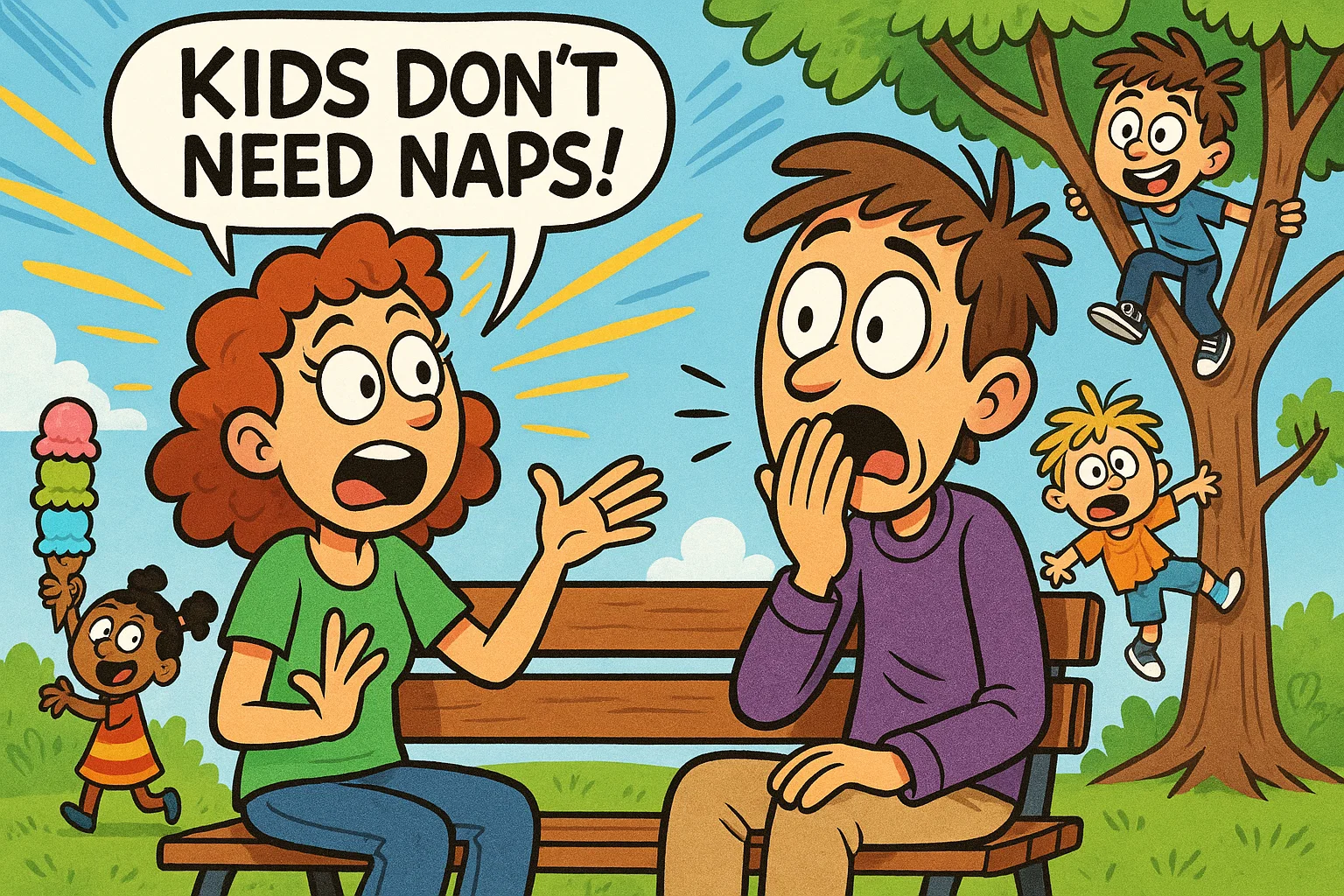Picture this: you’re a new parent, exhausted from sleepless nights with your crying baby, when suddenly everyone becomes an expert. Your mother-in-law suggests putting whiskey on your teething infant’s gums, a stranger at the grocery store insists you should never pick up your baby when they cry, and your well-meaning neighbor swears by keeping newborns awake all day for better nighttime sleep. Welcome to parenthood, where unsolicited advice flows more freely than your baby’s milk!
Every parent has a collection of these moments – those jaw-dropping pieces of parenting advice that make you wonder if the person speaking has ever actually met a child. While some guidance genuinely helps, other suggestions leave you questioning everything from basic human instincts to the laws of physics. This article takes a lighthearted dive into the most hilariously awful parenting tips that somehow continue circulating, proving that bad advice has remarkable staying power.
Why Bad Parenting Advice Can Be Funny
There’s something oddly comforting about terrible parenting advice. Perhaps it’s the sheer absurdity that makes parents laugh out loud, or maybe it’s the relief of realizing you’re not the only one receiving these gems of “wisdom.” The funniest bad advice often combines outdated beliefs with exaggerated solutions, creating a perfect storm of unintentional comedy.
The shock factor plays a huge role in why these tips become memorable. When someone suggests using sandpaper to “toughen up” sensitive areas for breastfeeding, the immediate response isn’t anger – it’s bewildered laughter. These moments become shared experiences that bond parents together, creating a universal language of “Can you believe someone actually said that?”
Humor as a Coping Mechanism in Parenting
Parenting experts have long recognized that humor serves as a vital coping mechanism during the challenging early years. When faced with sleep deprivation, endless crying, and the constant pressure to be a perfect parent, laughter becomes a survival tool. Those ridiculous pieces of parenting advice transform from sources of frustration into comedy gold.
Research suggests that parents who maintain a sense of humor report lower stress levels and better relationships with their children. When your toddler has a meltdown in public and someone suggests spanking as the immediate solution, laughing internally at the absurdity helps you stay centered and respond appropriately.
How These Tips Spread Despite Being Wrong
The persistence of bad parenting advice is fascinating. Cultural traditions, family habits, and the echo chambers of online forums create perfect conditions for these myths to thrive. A well-meaning grandmother passes down advice that worked in the 1950s, conveniently forgetting that safety standards and child development understanding have evolved significantly.
Social media amplifies this phenomenon, with viral “parent hacks” spreading faster than actual research-based information. The combination of nostalgia, anecdotal evidence, and the human desire to help creates an endless cycle of questionable wisdom.
Most Common “Worst Parenting Advice” People Actually Hear
“Sleep When the Baby Sleeps”
This classic piece of advice sounds wonderful in theory but falls apart faster than a house of blocks built by a toddler. The logic seems simple: baby sleeps, you sleep, everyone’s happy. Reality check: babies sleep for 2-3 hour stretches, often during the day, and somehow expect you to magically fall asleep instantly while ignoring the mountain of laundry, dirty dishes, and your basic human needs.
The funniest part? People who give this advice often forget that babies have an uncanny ability to wake up the moment you close your eyes. It’s as if they possess a special sensor that detects parental relaxation and immediately sounds the alarm. A more realistic version might be “stare longingly at your pillow when the baby sleeps.”
“Bite Your Kid Back”
When faced with a toddler going through their biting phase, some people suggest the brilliant solution of biting them back to “show them how it feels.” This advice fails on multiple levels, starting with the basic premise that a two-year-old possesses the cognitive ability to connect cause and effect in this scenario.
The mental image of an adult seriously chomping down on their child’s arm to teach a lesson is both disturbing and absurd. Better approaches include redirecting behavior, providing appropriate outlets for frustration, and remembering that most toddlers outgrow biting naturally without requiring parental teeth marks as motivation.
“Spanking Makes Kids Behave”
Perhaps no parenting topic generates more heated debate than spanking, with advocates insisting it’s necessary for discipline. Modern research consistently shows that physical punishment is less effective than positive reinforcement and can lead to increased aggression and behavioral problems.
The humor in this bad advice lies in its simplistic view of child psychology. The idea that complex behavioral issues can be resolved through physical intimidation ignores decades of child development research and treats children like they’re training for obedience school rather than developing their own moral compass.
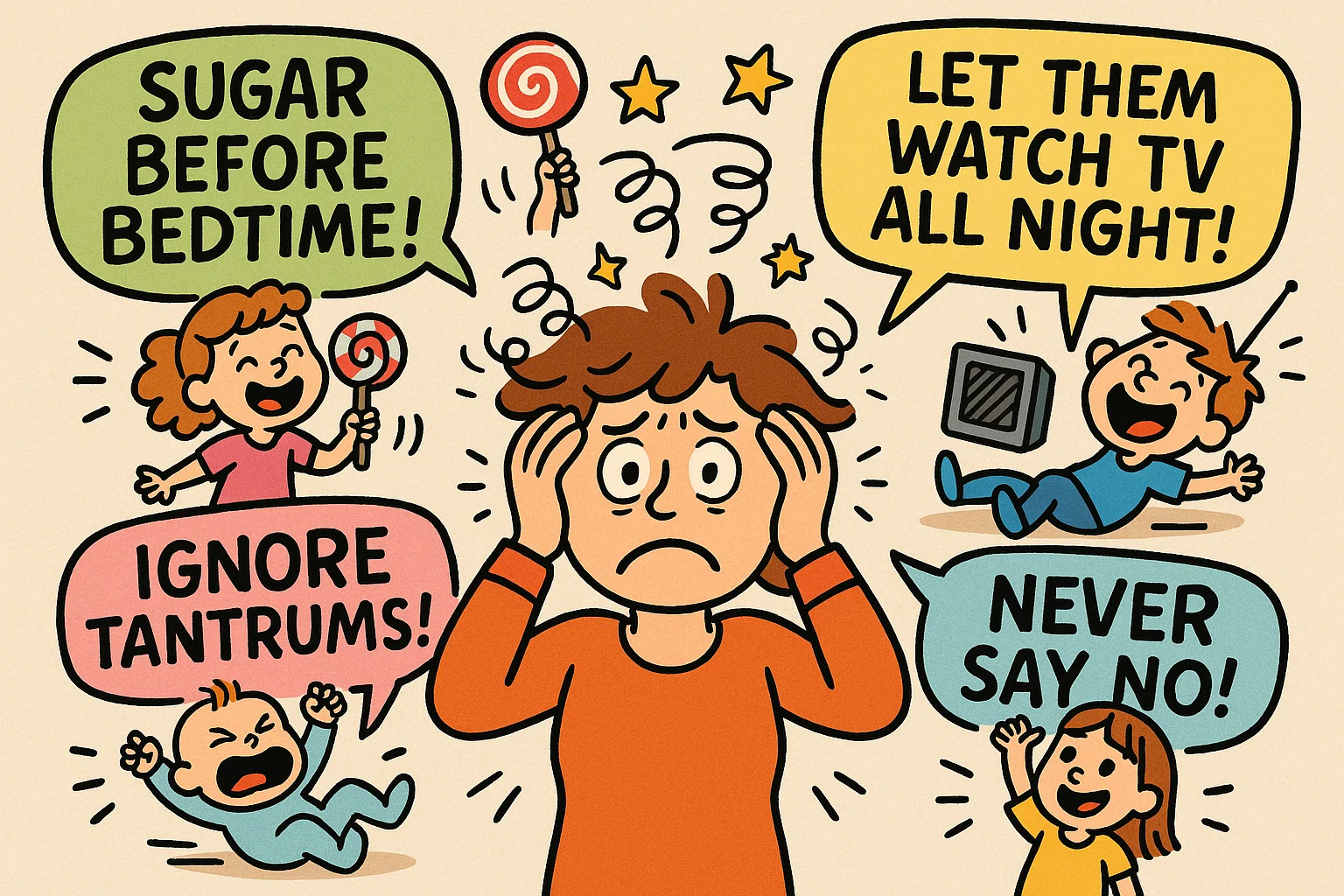
“Toughen Nipples with Sandpaper”
This gem of breastfeeding preparation advice deserves its own category of absurdity. The suggestion that expectant mothers should rough up sensitive skin with sandpaper to prepare for nursing demonstrates a fundamental misunderstanding of both anatomy and common sense.
Safe breastfeeding preparation actually involves proper positioning, good latch techniques, and gradual conditioning – not industrial-grade abrasives. The mental image of someone seriously considering this approach while even wandering the hardware store aisles is comedy gold.
“Don’t Pick Up a Crying Baby”
The notion that newborns are capable of manipulation is as hilarious as it is concerning. This advice suggests that tiny humans who can’t control their own bowel movements have somehow mastered the art of psychological warfare, plotting to turn their parents into servants through strategic crying campaigns.
Research consistently shows that responding to infant cries builds trust and emotional security. The idea of a manipulative newborn plotting world domination from their crib is entertaining fiction, not parenting reality.
“Keep Baby Awake All Day for Better Sleep”
This backwards logic suggests that an overtired baby will sleep better at night, ignoring the basic principle that exhausted babies often become increasingly difficult to soothe. The reality is that overtired infants frequently experience more fragmented sleep and increased fussiness.
Picture the scenario: parents desperately entertaining a cranky, exhausted baby all day, convinced they’re implementing a brilliant sleep strategy, only to face an inconsolable, overstimulated infant at bedtime. The plan backfires spectacularly, creating exactly the opposite of the desired outcome.
Real Stories of Hilariously Bad Parenting Tips
Outrageous Advice from Strangers
Public spaces become stages for unsolicited parenting performances. One mother reported a grocery store encounter where a stranger suggested putting her teething baby’s pacifier in bourbon, claiming it worked wonders for her own children “back in the day.” Another parent received detailed instructions on using duct tape to secure a diaper during a particularly challenging changing session in a restaurant bathroom.
These interactions highlight society’s strange relationship with parenting boundaries. Complete strangers feel entitled to offer medical advice, safety suggestions, and behavioral guidance based on outdated practices or misunderstood information.
Shocking Tips from Family and Friends
Family gatherings often become battlegrounds of generational parenting wisdom. One new parent shared how their grandmother insisted that babies needed to cry for hours to “develop their lungs,” while another reported receiving advice to put honey on pacifiers to keep babies calm – a practice now known to pose serious health risks.
The challenge with family advice is navigating the emotional minefield of rejecting well-intentioned suggestions from loved ones while maintaining family relationships while respecting different perspectives.
Internet Parenting Myths Gone Wild
Social media platforms have become breeding grounds for creative but dangerous parenting hacks. Viral posts suggesting everything from using essential oils as fever reducers to elaborate sleep training methods involving various household items spread faster than factual information.
One particularly memorable online myth suggested that colicky babies could be soothed by running the vacuum cleaner continuously, leading to parents creating elaborate sound systems and exhausted household appliances.
Why People Give Bad Parenting Advice
The Generational Gap in Parenting Styles
Parenting standards have evolved dramatically over the past few decades. What seemed normal and safe in previous generations may now be considered risky or outdated. Car seat safety, sleep position recommendations, and feeding guidelines have changed significantly based on new research and understanding.
Older generations often struggle to accept that their successful parenting methods might not represent best practices today. The emotional investment in past choices can make it difficult to acknowledge that improved knowledge leads to better outcomes.
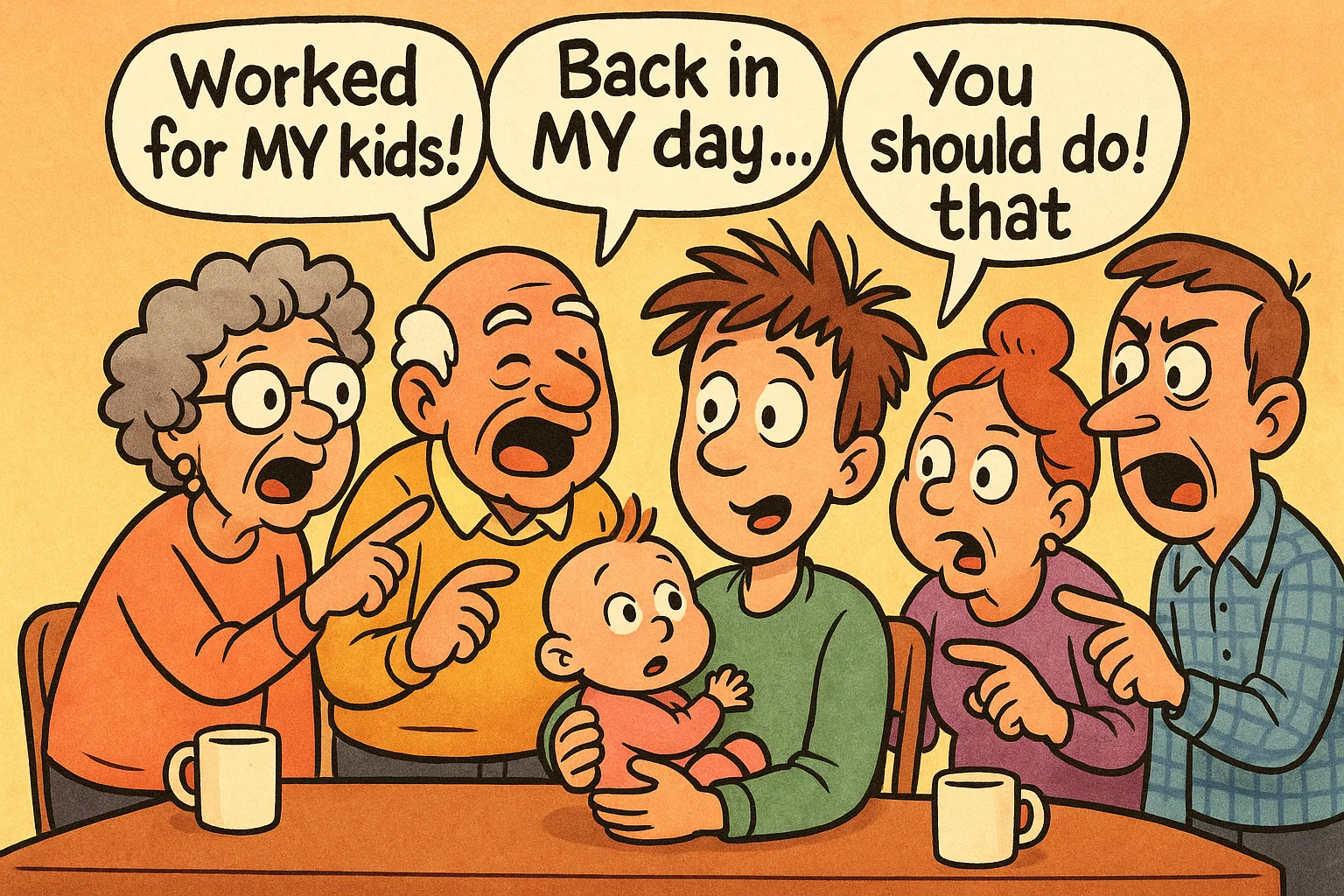
Confirmation Bias and “It Worked for Me” Thinking
People naturally defend practices that they believe contributed to their success. Parents who used certain methods with their children often attribute positive outcomes to those specific choices, even when other factors might have been responsible.
This creates a cycle where ineffective or potentially harmful advice continues circulating because someone, somewhere, had a positive experience that they connected to that particular practice.
How to Politely Handle Ridiculous Advice
Using Humor to Defuse Awkward Moments
A well-timed joke can redirect conversations without creating conflict. Responses like “Oh, that’s interesting – my pediatrician mentioned something completely different!” or “Thanks! I’ll add that to my list of creative parenting ideas” acknowledge the advice while maintaining your autonomy.
Humor allows you to stay gracious while protecting your decision-making authority as a parent.
Changing the Topic Gracefully
Master the art of conversational redirection by having ready topics that interest the advice-giver. Ask about their own experiences, current events, or anything that shifts focus away from your parenting choices.
Simple phrases like “Speaking of experiences, how are you enjoying…” can smoothly transition conversations into safer territory.
Sharing Science Without Sounding Preachy
When safety concerns require correction, frame information as recent discoveries rather than personal criticism. “The latest research suggests…” or “Our pediatrician mentioned that current guidelines recommend…” presents facts without implying that previous methods were wrong.
| Approach | Example Response | Why It Works |
| Acknowledge + Redirect | “That’s an interesting perspective! What worked for you when dealing with…” | Shows respect while shifting focus |
| Thank + Research | “Thanks for thinking of us! We’re following our doctor’s current recommendations” | Appreciates intent while establishing boundaries |
| Humor + Deflect | “Ha! That would definitely be memorable. How’s your garden doing this year?” | Lightens mood and changes subject |
When Bad Advice Stops Being Funny
Safety-Related Myths to Never Ignore
Some advice crosses the line from amusing to dangerous. Recommendations involving unsafe sleep positions, homemade formula recipes, or ignoring signs of illness require immediate, clear correction. When child safety is at stake, politeness takes second place to protection.
Examples of dangerous advice include suggestions to use honey for infants under 12 months, recommendations to ignore fever in young babies, or instructions to alter car seats in ways that compromise safety features.
The Fine Line Between Harmless and Dangerous Advice
Learning to distinguish between annoying but harmless suggestions and potentially dangerous recommendations is crucial for new parents. Trust your instincts when something feels wrong, and don’t hesitate to consult healthcare professionals when questions arise.
The general rule: if advice contradicts current medical guidelines or seems to ignore basic safety principles, seek professional input before considering implementation.
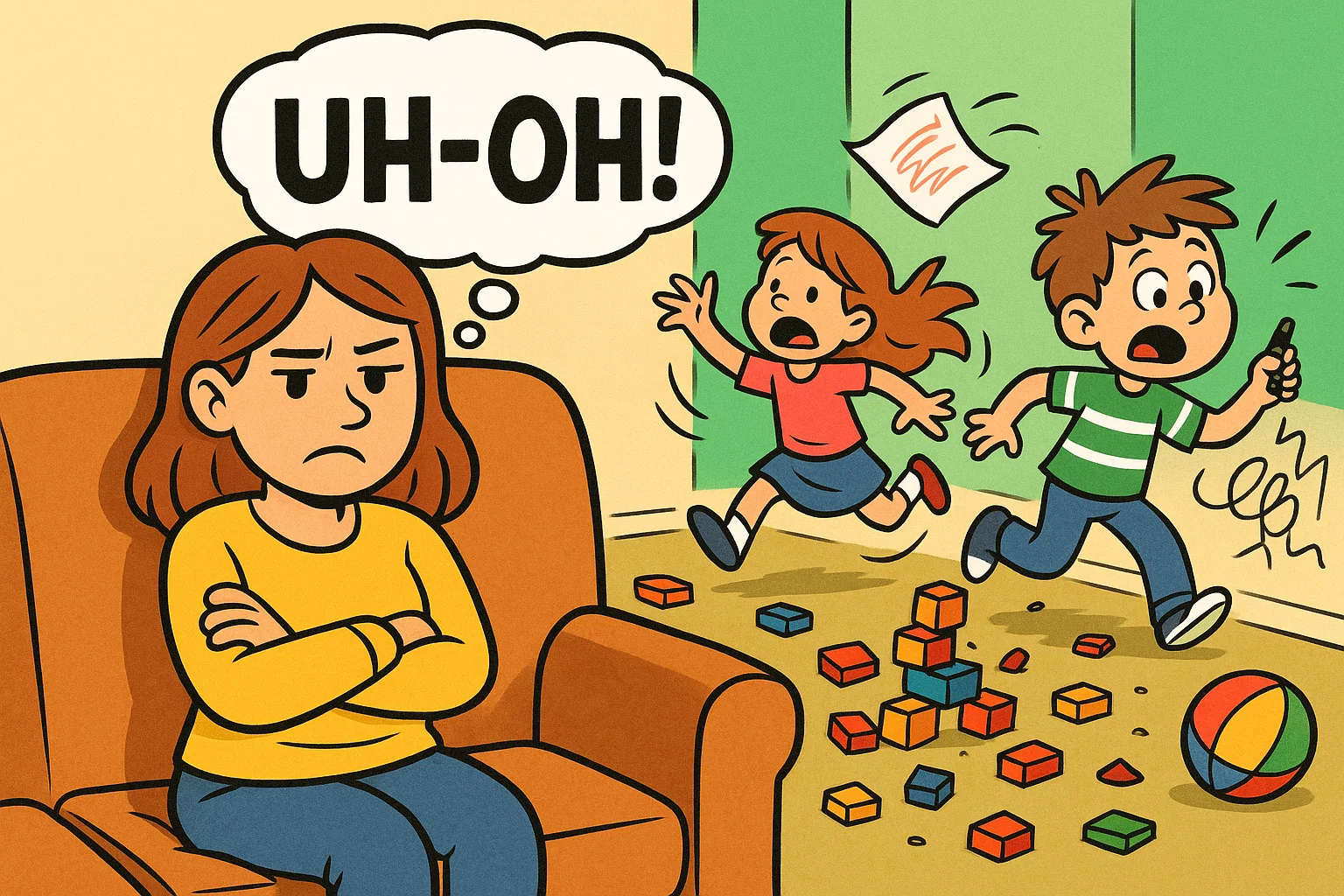
Best Parenting Advice to Balance Out the Worst
Encouraging Connection Over Control
The most valuable parenting wisdom focuses on building relationships rather than winning battles. Approaches that emphasize understanding, communication, and mutual respect tend to produce better long-term outcomes than methods based on control or intimidation.
Simple practices like reading together, having regular conversations, and showing genuine interest in your child’s thoughts create stronger foundations than elaborate discipline systems or rigid schedules.
Finding Humor in the Everyday Chaos of Parenting
The ability to laugh at parenting mishaps, unexpected situations, and your own mistakes makes the journey more enjoyable for everyone involved. Children learn valuable lessons about resilience, adaptability, and self-acceptance when they see their parents handling challenges with grace and humor.
Remember that perfect parenting is a myth – embracing the chaos and finding joy in unexpected moments creates more meaningful family experiences than striving for impossible standards.
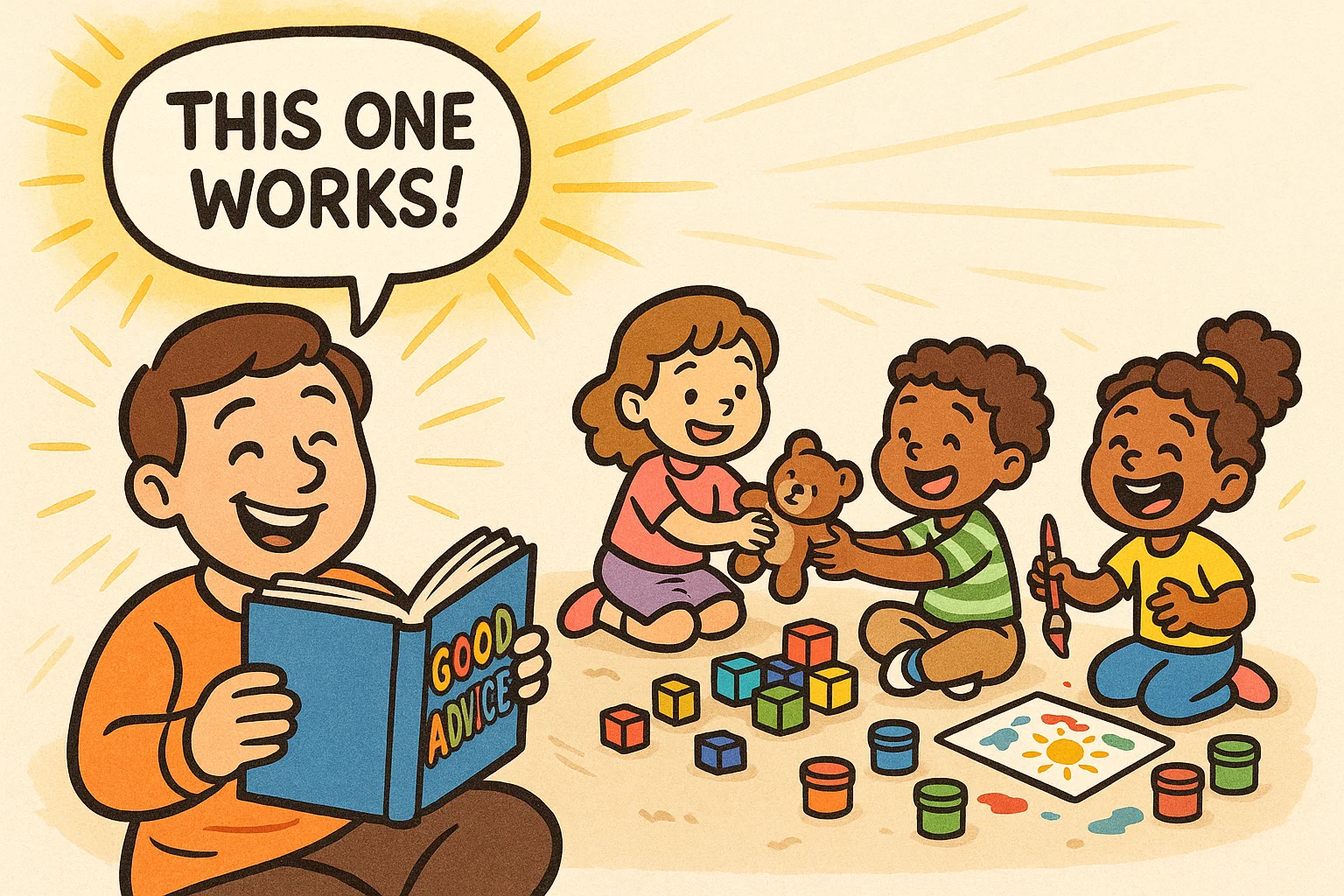
Final Thoughts
The world of parenting advice will always include its share of questionable gems, and that’s perfectly okay. These moments of absurdity serve important purposes: they unite parents in shared experience, provide comic relief during stressful times, and remind us that everyone has opinions about raising children.
While bad advice can be entertaining, remember that effective parenting comes from understanding your individual child, staying informed about current research, and trusting your instincts. Every family is unique, and what works for one may not work for another.
The next time someone offers a piece of advice that makes you question their connection to reality, take a deep breath, smile, and remember – this will make a great story someday. Feel free to share your own collection of hilariously awful parenting tips in the comments below. After all, laughter truly is one of the best parts of this wild adventure called parenthood!


